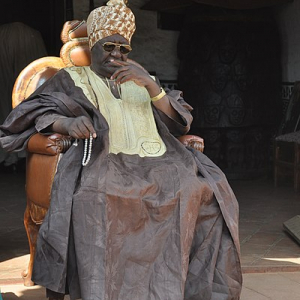The Life And Reign Of Sultan Mbombo Njoya

Across the world, the Bamoun people of Cameroon are entering a period of mourning for 40 days and 40 nights as we grieve the passing of Sultan Ibrahim Mbombo Njoya. Sultan Njoya passed on September 27 from complications due to COVID-19.
Known as “Le Lion de le Bamoun” he lived a long life of political service before succeeding the crown after his father passed away. After studying at The Institute of Administrative Studies in Dakar, Senegal he returned back to Cameroon where he became a senator, Vice Minister of Foreign Affairs as well as serving as Cameroon’s ambassador for Equatorial Guinea and Egypt, among other posts.
Sultan Njoya was crowned on July 28th, 1992, as the 19th king since the beginning of the Bamoun dynasty more than 600 years ago. Because of German colonization then the invasion of the French and British the written history of Cameroon in its entirety is hard to know for sure. Fortunately, generations of oracles or “griots” keep the traditions and history of our ancestors from dying out. But for the Bamoun people, this is even more heartbreaking as we no longer have a formal written language. Most of our history, art, and cultural books that were written in Shupamum were destroyed after the Kingdom of the Bamoun was illegally annexed into German Kamerun.
Foumban, the capital city of the Bamoun was and still is known as the “center of Arts” within the country and although we do have many written records we still survive and celebrate our culture through art, dance, and music. One of Sultan Njoya’s greatest contributions during his reign was the creation of the Royal Museum of Foumban. Built to resemble our crest, a double-headed snake with a spider in the middle. It features the work of the great Bamoun craftsmen, ancient weapons, and drawings. As well as multiple murals of our history and the entire lineage of the kings, where he will now be painted once the new king is crowned.
After contracting COVID-19, Cameroonian President Paul Biya airlifted Sultan Njoya to Paris, France where he stayed in Intensive Care at the American Hospital of Paris. This in itself speaks volumes for the state of the healthcare system in Cameroon. Even the most powerful among us are not able to receive quality care in the country. Most of Cameroon's and many other African country's medications, equipment, and other medical treatments come from Europe, specifically from France, and England. People thought that his seeking treatment in France would be a miracle. Receiving care in Europe would be the saving grace and that he would be cured almost instantly. But unfortunately, Sultan Njoya’s health took a turn for the worst. According to people from the palace where he lived, as Sultan Njoya took his last breath the electricity in the entire wing of the hospital and in Foumban went out. As he crossed over from the living to the land of our ancestors.
The palace and the people in Foumban will observe 40 days and 40 nights of mourning and prayer as is customary when a king dies. Since his death was announced people have been sitting outside of the palace to pay their respect, praying for him and prosperity for the next king and the village. The principal chiefs or “fons” in the village will also bring traditional gifts, like rice, oil, and fragrances in remembrance of him.
While this is happening it does bring up the question of the impact of COVID within the village. In a country that is already having serious implications with the transmission rates and vaccinations. Trust in the vaccinations are already very low, the king was vaccinated, and yet he contracted and passed away from the virus. People are already disbelieving of what is in the vaccine and many are conveyed that if you take it you will die within 2 years of getting it. Seeing Sultan Njoya, a man who is supposed to be the life of the Bamoun passes away will cause people to hesitate even further. Even with planned gatherings and many who attend to not be in masks and closely packed together the COVID rate and in Foumban could continue to rise. Although there are no official numbers as the government of Cameroon is trying its best to hide them, people are still contracting the virus and don’t have access to adequate health care and treatment.
Inna lillahi wa inna ilayhi raji'un
Long may he reign as he reunites with the ancestors who watch over our people.







